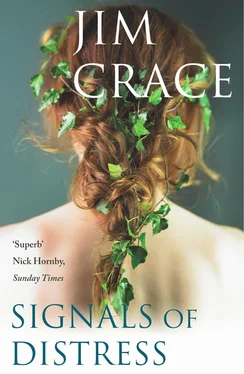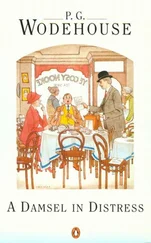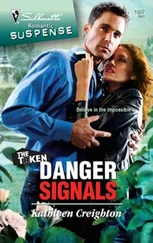But Aymer could meet Lotty Kyte instead. He’d see her by the river harbour, handing advertising bills out for her brother’s firm to new arrivals. She’d not remember him. How could she? She’d been blindfolded when they met in Wherrytown. Aymer hadn’t seen all of her face before. But no one could mistake the fleshless angles of her body, and that voice. ‘My brother can supply …’ He’d introduce himself, remind her about Wherrytown, and ask if she had any news of the Norrises. She had, she had! They’d cleared a piece of lakeside land a few miles north of St Jean-Luc. They’d built themselves a little hut. They’d even ordered furniture from Chesney Kyte, who else? Lotty, who helped her brother in the factory office, had sent a letter to the Norrises only last week informing them that Chesney would deliver their beds and sideboard and their chairs by wagon in a few days’ time. Could Aymer go with him? She’d ask.
What gift should Aymer take the Norrises? He’d buy a beaver hat for Robert. Castor fiber. And an ambered whalebone comb for Katie’s hair. It seemed to him that Wherrytown was Montreal. He had to stay awake that night, not to catch the Ha’porth of Tar along the English coast but to be on time for the wagon journey north, in Canada. He’d report to the Kytes at dawn. Chesney and his eldest boy would drive their four horses out of Montreal with furniture for five families roped to their wagon. There’d not be space for Aymer on the driving bench. He’d sit on one of the Norrises’ new chairs, watching the freshly printed ruts behind the wagon disappear into the flood plains to the south.
Aymer stared into the darkness of the parlour, and devised how the wagon ride would end with him and Katie … what? Arm in arm? Embracing? He guessed it took two days to reach the Norrises. Their cabin was a woodshed and a single room made out of pine logs, pine planks and maple frames. Their land was black from burning. Nothing grew between their cabin and the lake. Geese were picking through the ashes. The Kytes couldn’t get their wagon within fifty yards of the house. Too many trees were felled. The way was blocked by uncleared trunks and branches. Robert Norris was standing with a saw, down at the water’s edge, among the geese. He seemed more square, less clerkish, younger even. He had a beard. He pushed his spectacles up on his forehead when he heard the men approaching. He couldn’t believe his eyes. He hugged Aymer like a brother. ‘I knew that we must meet again,’ he said. They walked together, arm in arm, between the trunks of trees to where the wagon had been hitched. Together they lifted down the furniture. ‘Now we have everything we need,’ said Robert, and that ‘everything’ included Aymer too. ‘We wouldn’t wish to welcome you to Canada without the offer of a bed and chair.’
‘And is your wife quite well, and happily disposed to her new life?’
‘Oh, she is well! Why don’t you leave the furniture to us? Go to the cabin and surprise her there. She’ll be so happy to see an old friend such as you. She misses conversation.’
Aymer saw himself in Canada. He crossed the clearing like a young man, leaping over logs, not faltering, not caring if he fell. He couldn’t wait to see her face, to push the comb into her hair. She was singing in the cabin. He pressed his nose against the knots and eyes of the window glass. At first he couldn’t see the room. But then he found a square inch of the glass that wasn’t puddled. He could see the aura of the candlelight, and then the naked body of a woman, standing in a bowl of water. Her back was turned against the window and her hair was up. Her thighs were strong and freckled, just as he remembered them, although their tones were split in curving arcs of flesh, orange-warm from the candle flame, pink-cold from the window light. She was the salmon and the thrush. Her hair was sand. She sang. She washed herself in Aymer’s soap.
When she’d finished washing, Aymer fixed her in the bowl, dripping dry and struggling to find the verses of her song. As she sang she told a rosary of love on the double loop of chink-shells at her throat, his, hers, his, hers, his. Lacuna vincta. Aymer fancied that she searched for him, his chink-shells, the beauties that he’d found for her in Wherrytown. ‘I thank you, Mr Smith. A lovely one.’ Was Aymer looped forever round her neck? She stepped out of the bowl onto a piece of wood. She wrapped herself in cloth. She turned and faced into the window light. Such health and happiness, she had, such hope. Canada. Canadee. Canadee-i-o.
He’d wait outside and listen to her voice. He’d listened to her singing once before, when they’d stood together at the chapel wall — ‘For Death is but the Shaded Sea …’ This time she’d sing a lighter tune, but with such care and with such girlish and unconscious gravity that Aymer wouldn’t dare call out her name for fear of ending it.
WHAT HOPE for Otto, though? Could Aymer realize some health and happiness for him?
Aymer had fought Otto off, banned him from the parlour. He didn’t want to spend the night with him, contemplating what he’d suffered since the tackle-room door had been thrown back. But there was no escaping it. Aymer had to try and find a happy ending for the African as well. He put his head into his hands and pressed the palms onto his eyes until all the nighttime was excluded. He could feel his pulse tapping on his forehead and in his fingertips. There was, at first, a flat and bruising darkness beneath his eyelids from the pressure of his hands. Then heavy patterns came: the pheasant wings, the bark and bracken, the tapestries, the blue-red fogs, and finally the deep-brewed tropic undergrowth that he was hoping for. Aymer tried to impose Otto’s face onto the pulsing darkness, but Otto’s face, like Miggy Bowe’s, was hard to recollect. So Aymer concentrated on the tackle room. That was easy. He could remember it. The single window and the draughty winter light. The door, the bolt. The saddles and the saddle-cloth. The floor bricks and the straw. And in the straw a body sleeping.
Now Aymer could imagine Otto emancipated at Dry Manston, wrapped in his blanket and looking down from Cradle Rock at the Belle , idling on its sandbank. There’d be a rising dough of clouds coming in from Canada with snow. He’d bang his forehead with his fist. What kind of freedom had he found that tricked him into this? Was he supposed to wade out to the Belle and climb aboard? Should he descend the companion ladders to the orlop deck, put his ankles back in chains?
Aymer pictured Otto squatting on the frosty ground. The grass seemed petrified. He had encountered frost before, but on the Belle ’s rigging, not on land. What would he do with frost? He’d test it with his feet. He’d flatten it. His footprints were engrav’d in frost. But soon forgot. His blanket hung across his head. He swung from side to side on the pivot of his feet. He was a Cradle Rock of cloth. This was far too punishing. Aymer had to make him move, to look for help inland from some soft Radical, from some Samaritan, from George, perhaps. He had to make him run. The track was pitiless at first. It thwarted him. No shelter yet. No inn to welcome him. Freedom’s not the open sky, Aymer thought. It’s sheets, and heat. It’s Victuals, Viands and Potations.
The light was lifting as Otto ran, through the frost, the mud, across the unforgiving rocks. He seemed illuminated by some sharp and icy sun. He was like a boy, dodging through the heather and the gorse, leaping granite, skirting the low branches of wind-distorted trees. That wasn’t hard. Not hard for boys. But it was hard for Aymer to make the landscape change, to find a route for Otto between the granite and the thorn into the distant, humid fields of Africa. Aymer pressed his palms more firmly on his eyes and tried to make the land and earth come vaulting at him in a thousand forms, and every tumbling form a little warmer than the last, and every fleeting smudge of earth more succulent and odorous and dark and tropical. He tried to speed the landscape from grey and white to deeper green and yellow so that he could imagine the miracle of Otto home again. But he failed. No matter what he improvised, the landscape wouldn’t change.
Читать дальше












